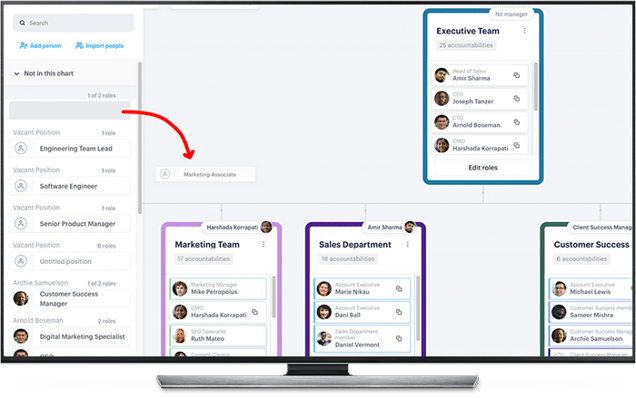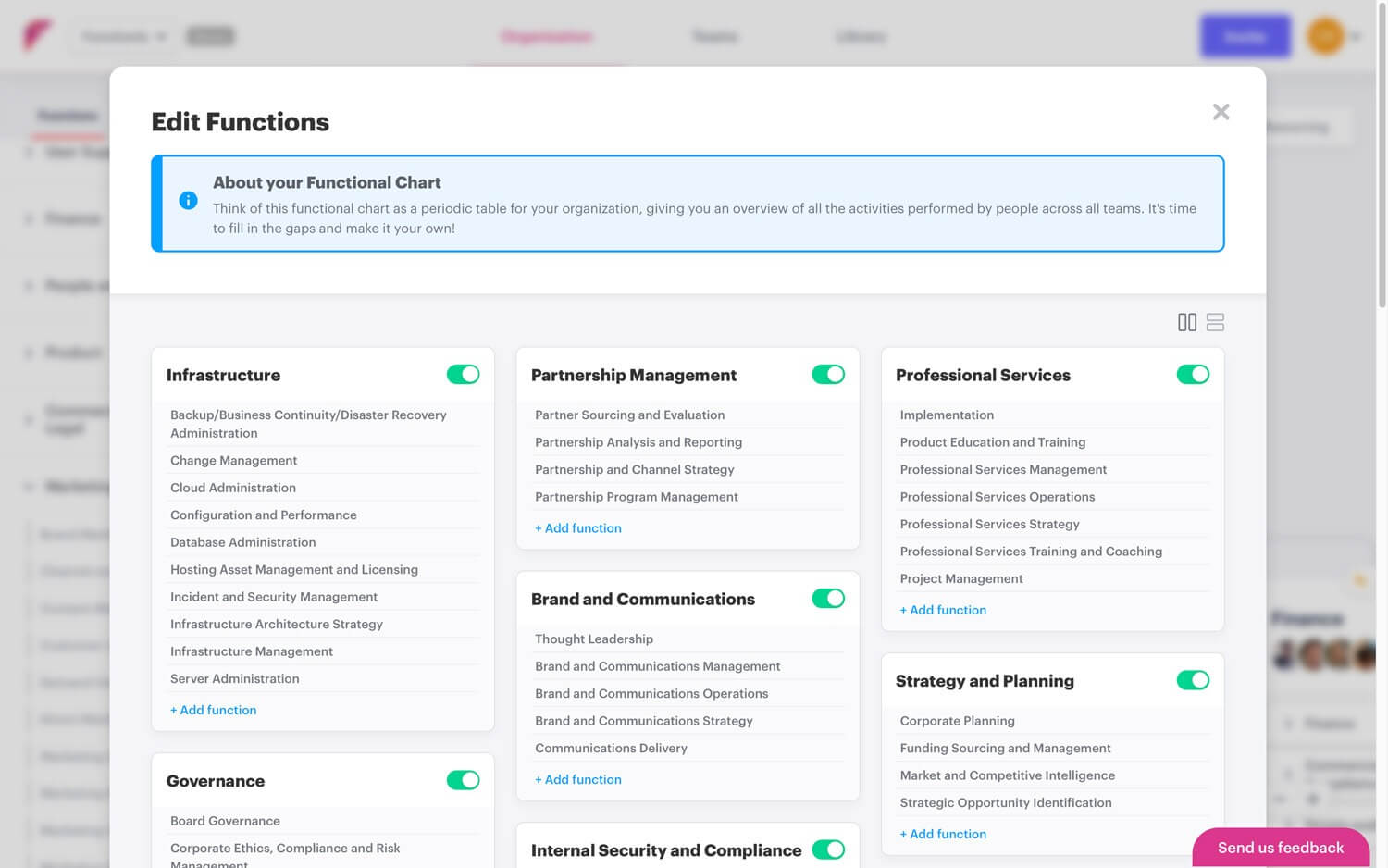When organizations make accountability a core part of their internal processes, decisions, and standards, it shows. It may seem intimidating, but accountability can transform a struggling organization into one that satisfies its customers, makes workflows more efficient, and meets its business goals.
Businesses that embrace the tough discussion of accountability and take steps to integrate it into everything they do can attest to its power and influence. But what is organizational accountability, and how can you start implementing it today?
You might be interested: Step by Step Tutorial on Building Functional Charts
What Is Organizational Accountability?
Organizational accountability is the establishment of values, processes, policies, and even organizational design to encourage accountability across the entire company. You can achieve full organizational accountability when all employees are committed to and capable of doing their part to meet organizational goals.
Why Is Organizational Accountability Important?
Organizational accountability is important because it ensures a smoother and more efficient workflow, leading to positive outcomes that earn customer loyalty, improve employee retention rates, and otherwise boost brand reputation.
Customer Loyalty
Organizational accountability directly impacts internal processes, but it doesn’t stop there. When things are running smoothly internally, it affects customer service, product quality, and delivery of services. And when people identify an accountable organization, they will choose to work with that company over its competitors.

Employee Retention Rates
Talented, motivated people want to work for organizations where accountability is a primary cultural component. No one wants to stick around in jobs where they can’t trust their team members to do their jobs. Instead, they would rather use their talents and pursue development opportunities in organizations where they can rely on their coworkers and managers to do their jobs effectively.
Accountability also leads to more peaceful work environments. When you implement accountability at every level, it leads to fewer work-related conflicts over who is responsible for what. It also lessens the risk of frustration that some team members are not doing their share.
Brand Reputation
Customers want to work with a company they can trust. The problem is that no one trusts a company that keeps everything close to the chest. But when organizations go out of their way to be transparent with their stakeholders, customers, and the general public, they openly promote accountability and improve their reputations.
4 Impacts of a Lack of Organizational Accountability
A lack of organizational accountability can lead to the deprecation of systems and processes that are integral to company operations. Where there is no accountability, things don’t get done, and the company doesn’t achieve its goals.
1. A Culture of Distrust
One of the fastest ways to foster distrust among your team members is to fail to encourage an environment of accountability. When there is no accountability, no one feels like they can count on other workers to take ownership of projects, and initiatives fail or fall behind.
In the short term, a lack of trust diminishes communication and collaboration. And when trust is diminished or destroyed entirely, it is extraordinarily difficult to reintegrate it back into the culture. As such, organizations that fail to preserve internal trust are doomed to suffer long-term damage.
2. Failed Initiatives
When team members across your organization don’t hold themselves or others accountable, your teams won’t reach their goals. You’ll regularly struggle to complete even basic projects successfully and on time. Yes, a poor strategy may also be to blame, but if you’re seeing consistent failures across multiple teams and initiatives, that is an accountability issue.
Accountability is improved when team members have a sense of ownership over their individual outcomes, whether that’s the successful completion of a project, deliverables within a project, or the achievement of a specific goal. But without accountability, no one feels that sense of ownership. So they may execute their job duties, but they won’t be invested in the bigger picture.
3. Low Morale
When employees notice that an organization has lost its sense of accountability, they become demoralized and lose motivation. It becomes clear that their hard work won’t lead to anything positive for themselves or their employer, so they often just stop trying. Then, they become a part of the problem, just another team member contributing to that same lack of accountability.
But in a culture of accountability, everyone’s work has a purpose. Team members know that other people in the organization are doing their jobs and being held accountable for their own outcomes, which lifts morale and keeps workers engaged.
4. Difficulty Setting Priorities
Every worker should be able to articulate their priorities, their team’s priorities, and the organization's priorities. If they can’t do that, then there’s no way they can be expected to feel any sort of accountability. Worse, they’ve likely not witnessed accountability in their teammates or managers.
When people aren’t aware of what they are accountable for, or if they’re simply not accountable for anything, they aren’t going to know how to set their priorities. And when they can’t set priorities for themselves, they can’t contribute to the organization’s most important goals.
What Hinders Accountability in an Organization?
Several factors may contribute to a lack of organizational accountability. Here are some of the most common.
Lack of Clearly Defined Roles and Functions
Most businesses divide their operations into different functional teams. Ideally, these teams have clearly defined purposes and are the result of careful organizational planning. Each functional team contains roles with their own definitions and assigned accountabilities.
Unfortunately, this doesn’t always happen. For example, a startup might experience rapid growth, and teams may grow and change without adequate planning or documentation. Soon, any connections between roles and business outcomes become blurred.
 Functionly screenshot showing assignment of roles to teams and people.
Functionly screenshot showing assignment of roles to teams and people.
Negative Management Styles
Many people have negative perceptions of the concept of accountability. They often associate the word with authoritarian, top-down leadership, where negative consequences are doled out for failing to reach often unreasonable expectations.
Sadly, some organizations encourage this very management style, whether actively or passively. This does nothing to foster a sense of accountability and has the opposite effect. People stop taking initiative and spend their time focused on avoiding negative attention from management.
Failure to Set or Enforce Expectations
Creating a punitive culture doesn’t lead to accountability. However, creating a consequence-free culture doesn’t help either. Policies must be clear, and people must understand what their roles entail and what they are accountable for. Additionally, managers must make it clear that responsibility for outcomes is something that everyone must take seriously.
How to Increase Commitment to Accountability
It’s clear that everyone benefits when there is a strong sense of company-wide accountability. The challenge is instilling that in every worker and embedding it within the company culture. So how do you do that?
Start at the Top When Setting Examples
It will be nearly impossible to get employee buy-in for accountability measures if team members don’t see any accountability from managers and executives. While it’s tempting for managers to see themselves as exempt, lack of accountability should never be treated as a management perk. Instead, managers must be very aware of their influence and commit to being good examples.
Make Accountability a Hiring Priority
It makes sense to prioritize a potential hire’s talents and technical skills when making hiring decisions, often to the point of ignoring soft skills like communication and accountability. However, while knowledge-based skills develop over time with coaching, it’s not as easy to teach these more abstract, internalized traits. For this reason, you should prioritize valuable qualities like accountability when hiring.
Leverage Peer Influence
No one wants to be the person who causes a project to be delayed or be the reason that another team member misses a deadline. As a result, peer influence can be a very effective tool. For example, you can hold weekly accountability check-ins where each team member can deliver a progress report on their action items, progress, and roadblocks. These reports can seem intimidating, but they go a long way toward motivating team members to contribute regularly in active ways.
Encourage Self-Accountability
A great way to bridge the gap between autonomy and accountability is self-accountability, where you proactively ensure that you achieve the outcomes you are responsible for. This might include working late to meet a deadline or simply acknowledging a mistake that causes extra work for others.
Make Accountabilities Public Knowledge
Accountabilities should never be kept secret. Instead, they should be very clearly documented in organizational charts. Every team member should have access to documents that allow them to verify their responsibilities and see where other accountabilities lie. This kind of transparency helps to instill accountability as a top priority.
Fortunately, organizational charting software like Functionly allows you to create and share charts, maps, and other graphics across the organization. These can be made available to tenured workers or new employees at every level. Once these accountabilities are clear, everyone will know their assigned outcomes and responsibilities.

Related Articles on Accountability
- Mastering Accountability: A Step-by-Step Guide to Building an Effective Functional Chart
- The Big Benefits of Accountable Employees
- Team Accountability Matters: Here's How To Improve It
- Executive Accountability Template: General business functions
- Transform Your Project Management with the RASIC Framework
- Mastering the RACI Matrix: A Leader's Guide to Project Clarity and Team Success
- Transforming Remote Teams: Strategies for Building Accountability
- Understanding Accountability vs. Responsibility: The Differences I've Learned as a Leader
- Mastering Measuring Accountability: Techniques to Boost Team Performance





